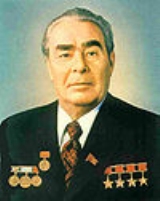
6 December) – 10 November 1982) was the General Secretary
of the Central Committee
(CC) of the Communist Party of the Soviet Union
(CPSU), presiding over the country from 1964 until his death in 1982.
There is nothing more practical than a good theory.![]()
Every man must be made to realize that further retreat is impossible. He must realize with his mind and heart that this is a matter of life and death of the Soviet state, of the life and death of the people of our country...the Nazi troops must be stopped now, before it is too late.![]()
The most important thing in my life, its leitmotif, has been the constant and close contacts with working people, with workers and peasants.![]()
As you know, I am not a writer but a Party functionary. But like every Communist I consider myself to have been mobilized by Party propaganda and deem it my duty to participate actively in the work of our press.![]()
I shall add that only he who has decided to commit suicide can start a nuclear war in the hope of emerging a victor from it. No matter what the attacker might possess, no matter what method of unleashing nuclear war he chooses, he will not attain his aims. Retribution will inevitably ensue.![]()
Soviet people are better off materially and richer spiritually.![]()
Modern science and technology have reached a level where there is the grave danger that a weapon even more terrible than nuclear weapons may be developed. The reason and conscience of mankind dictate the need to erect an insuperable barrier barrier to the development of such a weapon.![]()
It is madness for any country to build its policy with an eye to nuclear war.![]()
The rout of fascism, in which the Soviet Union played the decisive role, generated a mighty tide of socio-political changes which swept across the globe.![]()
We are entirely for the idea that Europe shall be free from nuclear weapons, from medium-range weapons as well as tactical weapons. That would be a real zero option.![]()

